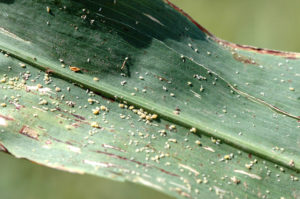by Kay Ledbetter, Texas A&M AgriLife Communications

Sugarcane aphids are beginning to show up in sorghum fields in the High Plains. (Texas A&M AgriLife photo by Kay Ledbetter)
AMARILLO – While sugarcane aphid populations are still low in grain sorghum fields across the Texas High Plains, a Texas A&M AgriLife Extension Service specialist in Amarillo said they are beginning to establish and could reach treatable numbers.
Dr. Ed Bynum, AgriLife Extension entomologist, said sugarcane aphid populations in the South Plains only recently reached economic levels in some fields that justified treatment with insecticides. Infestations in the field can be just a few aphids per plant to a thousand or more aphids per plant.
Infestations were found the first week of August in sorghum fields in Parmer and Deaf Smith counties in Texas and DeBaca County in New Mexico. More sugarcane aphid presence has been reported this week in Moore, Sherman, Hansford and Ochiltree counties, he said.
“We need to make sure producers are out checking their fields, scouting for the sugarcane aphid and are prepared when insecticide applications are warranted,” Bynum said.
For identification purposes, the sugarcane aphid has dark cornicles, tips of antennae and feet, and no stripe down its back, he said. Their damage is caused by the piercing sucking mouthparts, which puts the plant in poor health and can keep it from fully developing. Excess plant sap during feeding is left on the leaves as a sticky substance called honeydew. A black sooty mold will grow on the honeydew causing a reduction of photosynthesis.
AgriLife Extension entomologists have advised the threshold for the High Plains is to treat when:
– 20 percent of plants have aphids in the pre-boot stage.
– 20 percent of the plants have more than 50 aphids in the boot stage.
– 30 percent infestation in the flowering-milk stage.
– 30 percent infested with localized areas of heavy honeydew and established aphid colonies in soft dough and dough stages.
– At black layer, when heavy honeydew and established aphid colonies are present, treat only for preventing harvest problems.
Bynum said field trials have shown only two chemicals provide good control of the aphid. These products are Transform and Silvanto.
Other insecticide products recommended for control have not proven to be effective in studies across Texas, he said.
“Producers can control the sugarcane aphid if they stay on top of the situation and make timely applications,” Bynum said.
For the most up-to-date news, sightings, recommendations on sampling and control, go to http://txscan.blogspot.com.